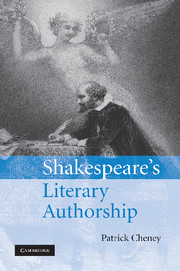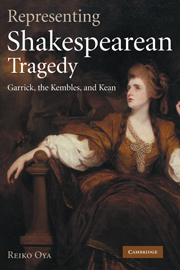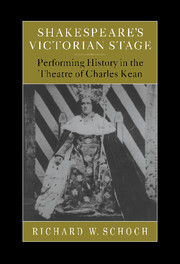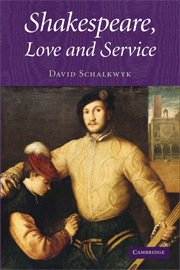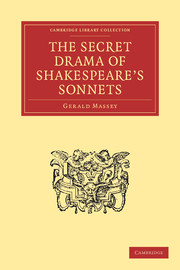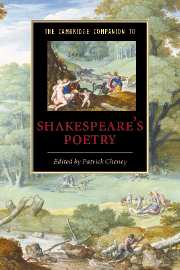Shakespeare's Literary Authorship
£38.99
- Author: Patrick Cheney, Pennsylvania State University
- Date Published: July 2012
- availability: Available
- format: Paperback
- isbn: 9781107404595
£
38.99
Paperback
Other available formats:
Hardback
Looking for an inspection copy?
This title is not currently available on inspection
-
Re-situating Shakespeare as an early modern professional, in this book Patrick Cheney views him not simply as a man of the theatre, but also as an author with a literary career. Rather than present himself as a national or laureate poet, as Spenser does, Shakespeare conceals his authorship through dramaturgy, rendering his artistic techniques and literary ambitions opaque. Accordingly, recent scholars have attended more to his innovative theatricality or his indifference to textuality than to his contribution to modern English authorship. By tracking Shakespeare's 'counter-laureate authorship', Cheney builds upon his previous study on Shakespeare and literary authorship, and demonstrates the presence throughout the plays of sustained intertextual fictions about the twin media of printed poetry and theatrical performance. In challenging Spenser as England's National Poet, Shakespeare reinvents English authorship as a key part of his legacy.
Read more- Analyses Shakespeare's full professional career, poems and plays, within a nationalist setting
- Includes a detailed study of Shakespeare's literary relations with his contemporary authors Edmund Spenser and Christopher Marlowe
- Builds upon the author's previous study on Shakespeare within a nationalist setting
Reviews & endorsements
'Patrick Cheney's new monograph greatly enriches our sense of Shakespeare's authorial status in his own time. Cheney's incisive readings of plays of all genres, from early to late, suggest a playwright who reflected on literary authorship while functioning successfully within an intensely collaborative theatrical environment - a Shakespeare, in short, who could write both to the moment and for all time.' Lukas Erne, University of Geneva
See more reviews'… great value in Cheney's book. The approach yields many fine insights into Shakespeare as an artist … The argument is coherent, significant, and richly productive of careful reading.' David Bevington, University of Chicago
'Cheney has given us a fresh, elegant perspective on the plays that illuminates Shakespeare's engagement with other writers.' Early Modern Literary Studies
'There is no doubt that Cheney's two volumes mark a significant step in the road to a more accurate and less restricted revaluation of Shakespeare's place in the history of English poetry, including lyric, verse narrative as well as drama, in a continuous line that has every claim to the title 'works'. It is in every sense a laureate achievement that hardly needs the qualification 'counter'.' Archiv
'Cheney's argument about the elusive form of authorship he describes is convincing because of the sustained readings of specific details the book offers - his method of seeking authorship in intertextual traces is both suggestive and effective.' Edward Gieskes, University of South Carolina
Customer reviews
Not yet reviewed
Be the first to review
Review was not posted due to profanity
×Product details
- Date Published: July 2012
- format: Paperback
- isbn: 9781107404595
- length: 324 pages
- dimensions: 229 x 152 x 18 mm
- weight: 0.48kg
- availability: Available
Table of Contents
Introduction: 'Printless foot': finding Shakespeare
Part I. Rethinking Shakespearean Authorship:
1. The epic spear of Achilles: self-concealing authorship in The Rape of Lucrece, Troilus and Cressida, and Hamlet
2. The forms of 'counter-laureate authorship': Titus Andronicus, A Midsummer Night's Dream, 1 Henry IV, The Tempest
3. Lyric poetry in Shakespearean theatre: As You Like It, 1 Henry IV, Henry V, The Tempest
4. Books and theatre in Shakespeare's plays: Richard III, Love's Labour's Lost, Romeo and Juliet, Othello
Part II. Fictions of Authorship:
5. 'Shows of love . . . bookish rule': theatre, book, and literary history in 2 Henry IV
6. Halting sonnets: the comedy of Petrarchan desire in Much Ado about Nothing
7. The profession of consciousness: Hamlet, tragedy, and the literary eternal
8. Venting rhyme for a mockery: Cymbeline and national romance.
Sorry, this resource is locked
Please register or sign in to request access. If you are having problems accessing these resources please email [email protected]
Register Sign in» Proceed
You are now leaving the Cambridge University Press website. Your eBook purchase and download will be completed by our partner www.ebooks.com. Please see the permission section of the www.ebooks.com catalogue page for details of the print & copy limits on our eBooks.
Continue ×Are you sure you want to delete your account?
This cannot be undone.
Thank you for your feedback which will help us improve our service.
If you requested a response, we will make sure to get back to you shortly.
×
